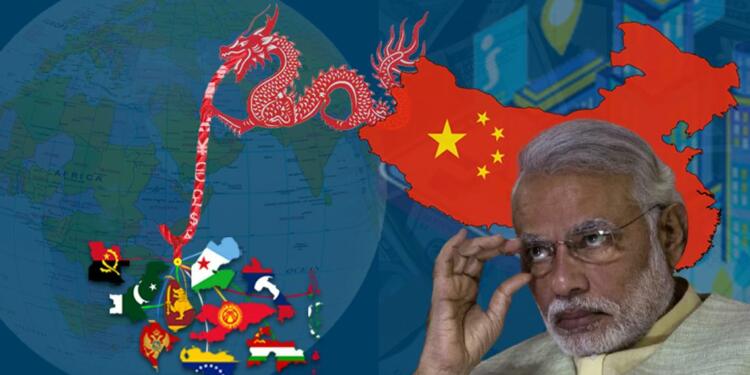India on Tuesday humbled China at the United Nations Security Council (UNSC), where in a not-so-subtle way, it took a swipe at the communist nation for its nefarious debt-trap diplomacy tactics. Reportedly, Minister of State for External Affairs Dr. Rajkumar Ranjan Singh, during an open debate on ‘Maintenance of International Peace and Security: Exclusion, Inequality and Conflict’ at the UNSC, made the remarks which must have rattled China, considering how it is not used to such direct confrontations at global platforms.
The Minister said, “India has always strived to foster global solidarity across the world with our development partnership efforts fully respecting national priorities and ensuring that our assistance remains demand-driven, contributes to employment generation and capacity building, and does not create indebtedness. This is particularly true in countries in the post-conflict phase,”
India’s ‘Neighbourhood First’ policy: Rajkumar Ranjan Singh:
Moreover, by stating that humanitarian assistance need not be politicized, India made a thinly-veiled reference to China’s poor human rights record and especially when concerned with the Uyghur Muslims. Ranjan stated, “We also need to avoid politicizing humanitarian and developmental assistance in conflict situations. The humanitarian action must be primarily guided by the principles of humanity, neutrality, impartiality, and independence,”
The minister added that whether it is with India’s neighbours under the “Neighbourhood First” policy or with African partners or with other developing countries, “India has remained and will continue to be a source of strong support to help them build back better and stronger.”
Sri Lanka and the debt trap:
Reported extensively by TFI, there have been global concerns over debt traps and regional hegemony by China using its ambitious and failed Belt and Road Initiative (BRI) projects.
Hambantota Port in Sri Lanka has been a living, breathing example of China’s invasive debt-trap diplomacy. The controversial project came up during the tenure of former President Mahinda Rajapaksa, and it was a major reason for the deterioration of Indo-Sri Lanka relations.
What added to India’s woes was the fact that Sri Lanka, after being unable to pay off the debt, handed over the port and a mammoth 15,000 acres of land around it to the Chinese, on a 99-year lease. This was strategically crucial for China, as it gained foothold just a few hundred miles off the shores of India.
However, in the last year and a half, Sri Lanka has started following an ‘India first’ policy. Gotabaya Rajapaksa’s New Delhi outreach after coming into power shows how the two countries have overcome all insecurities and misunderstandings. The two countries are now looking to explore the possibilities of forging renewed strategic ties.
In 2019, Gotabaya Rajapaksa had visited India in his first official visit to any country after getting elected as Sri Lanka’s President. New Delhi had then extended a US $450 million in soft loan to Sri Lanka.
Also read: Sri Lanka seeks India’s help to come out of the Chinese debt trap
Maldives – an island nation saved by India:
Another island nation in southeast Asia — Maldives, had recently poured its heart out when the Indian government extended ‘half-a-billion Line of Credit’ to help it crawl out of the sinkhole of China’s ominous debt-trap diplomacy.
India and Maldives used to enjoy very warm ties before the election of Abdulla Yameen, who came to power in 2013. Since assuming the responsibilities of the state, he had shown a clear leaning towards China and allowed Chinese companies to build infrastructure in the country.
His policies included anti-western rhetoric and he openly supported Islamization of the Maldivian society, and as a result, India’s relations with the Maldives deteriorated significantly.
Also read: India defuses the Chinese bomb in Maldives. Maldives says thank you!
In 2018, former president Mohamed Nasheed said that China had handed over an invoice of 3.2 billion dollars–nothing more, nothing less, just a plain receipt of the amount. Recently, owning to Maldives’ growing proximity to India, China’s Exim bank had asked the island country to repay 10 million dollar loans given to former president Yameen’s ally- Sun Ahmed Siyam.
After the pro-China President Abdulla Yameen was thrown out of power, all obstacles were removed when it came to the strategic ties between India and Maldives.
The Greater Malé Connectivity Project (GMCP) funded by India is now being billed as the largest ever infrastructure project in the country. The project will connect the capital city of Maldives- Malé with Villingili, Thilafushi and Gulhifalhu via bridges and causeways of a total length of 6.695 kilometres.
Mauritius:
Similarly, another island nation of Mauritius in Africa became a target of China’s predatory debt trap tactics. Chinese plunder of Africa under the facade of converting their natural resources into energy for development meant that Mauritius wanted an exit from the BRI scheme.
As a result, India started developing the Mauritian islands of Agaléga as a naval base to keep China in check. In 2015, after PM Modi visited the island nation, he signed an agreement to develop the strategically important airbase. The South Block then expedited the process of leasing the Agaléga islands, keeping the Mauritian government in confidence.
Mauritius and India have excellent bilateral relations and people-to-people ties. Under PM Pravind Jugnauth, those ties have only soared. Indians are extremely proud of the diplomacy extended to the Vanilla Islands, as it strengthens India’s naval position against China’s invasive and belligerent ambitions in the Indian Ocean.
Seychelles:
Like Agaléga islands, India has also developed the Assumption Island in Seychelles to keep China at bay. The Coastal Radar facility has been operational since March 2016 in Seychelles, and the island country also allowed India to set up military infrastructure on the island last year, which shows that India has been able to forge rather close ties with the strategically located Vanilla Island country.
To win the hearts in Seychelles, India had even sent aid under mission Sagar 1 to the island country, to get over the COVID-19 pandemic. Meanwhile, New Delhi is also engaged in building a number of infrastructure projects in the country. These include the Attorney General’s Office, the Secretariat building, Police Headquarters, and a state of the art Convention Centre for Seychelles.
PM Modi and his foreign policies are well and truly in perfect sync with the national interest of the country. India’s foreign policy has always been constructive and supportive towards its neighbours, rather than bullying them to our needs, as done by Washington DC and Beijing. His detractors who continuously chirped that India was losing its hold over the neighbours have been served a gentle but cold reminder by the recent actions to salvage the debt-trapped countries and now the bold statements at UNSC.






















